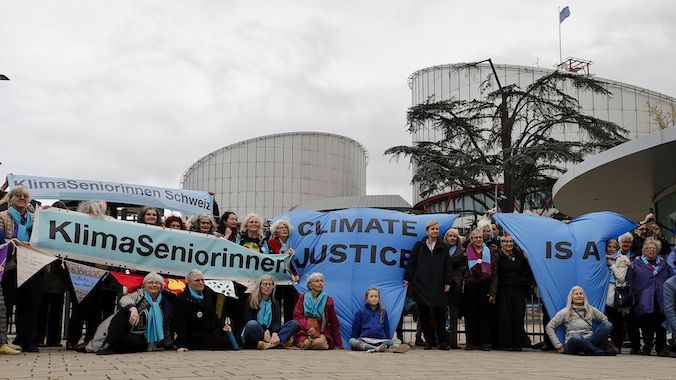European Court Ruling Cements Climate Change as a Human Rights Issue
Photo by RONALD WITTEK/EPA-EFE/Shutterstock
The European Court of Human Rights ruled that Switzerland violated its citizens’ human rights by failing to adequately address climate change on Tuesday. Even as it threw out two other similar cases, the ruling in Verein KlimaSeniorinnen Schweiz and Others v. Switzerland may have far-reaching implications for lagging national efforts to cut emissions and reduce climate change impacts.
The Swiss case was brought by a group of several thousand senior women as well as four individuals, who argued that the country’s failure to mitigate climate change had adverse effects on their living conditions and health. The Court, which is based in Strasbourg and is part of the Council of Europe, ruled that the four individuals did not fulfill “victim-status criteria” under the European Convention on Human Rights; but the association did have appropriate standing, and in a 16-1 vote the Court ruled in its favor.
The ruling said there was “a violation of Article 8 (right to respect for private and family life) of the European Convention on Human Rights.” And more:
The Court found that the Swiss Confederation had failed to comply with its duties (“positive obligations”) under the Convention concerning climate change. There had been critical gaps in the process of putting in place the relevant domestic regulatory framework, including a failure by the Swiss authorities to quantify, through a carbon budget or otherwise, national greenhouse gas (GHG) emissions limitations. Switzerland had also failed to meet its past GHG emission reduction targets.
Meanwhile, the Court dismissed two other similar cases, one brought by the former mayor of the French town of Grande-Synthe against his home country, and the other by several Portuguese plaintiffs against their home country and 32 others. Still, experts think the ruling in the Swiss case is a critical one as lawsuits around the world try and force governments’ hands when it comes to addressing climate change.
Joie Chowdhury, a senior attorney for the Center for International Environmental Law told The Washington Post that the judgment “leaves no doubt: The climate crisis is a human rights crisis, and [countries] have human rights obligations to act urgently and effectively.”
Lucy Maxwell, co-director of the Climate Litigation Network, told Bloomberg that the decision is “hugely important for government accountability and government climate action because it affirms that climate change is a human rights crisis, and that climate action is a legal duty.”
The decisions of the European Court are theoretically binding, but there are often huge delays to enforce them — in fact, thousands of such decisions have never been enforced.
Still, lawsuits are seen as an increasingly important tool in pushing climate action. In the U.S., the first of dozens of youth-led climate lawsuits emerged with a victory in Montana, where a judge ruled that the state constitution’s guarantee to a “clean and healthful environment” meant it needed to directly address greenhouse gas emissions. More are approaching trial dates; in June, a youth-led case in Hawai’i will take aim at the state’s department of transportation.
In a sense, the European ruling just puts other countries on notice. With Paris Agreement targets still flailing in the breeze, there may still be consequences for failure — even if the Agreement itself lacks any real sort of enforcement mechanism, and individual countries can’t fix everything on their own.
“This ruling should also remind other states of their international obligations: those who set climate targets are responsible for meeting them,” said Ottmar Edenhofer, Director of the Potsdam Institute for Climate Impact Research, in a statement. “However, it is also clear that Europe cannot meet the 1.5°C target on its own and that Switzerland does not bear sole responsibility here either…. The entire international community is responsible for combating climate change.”